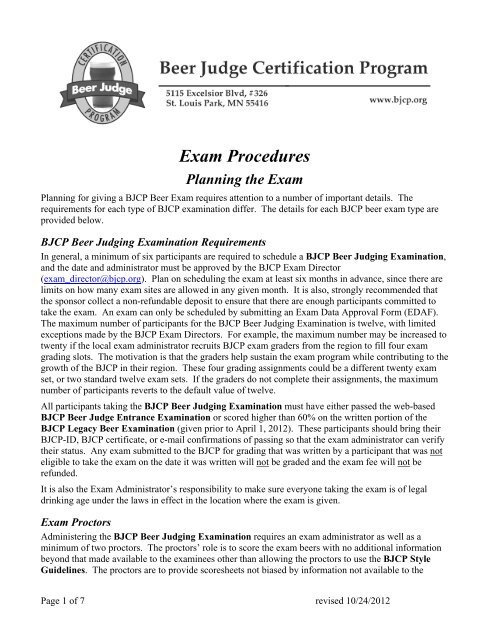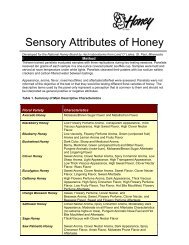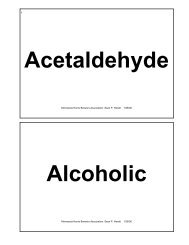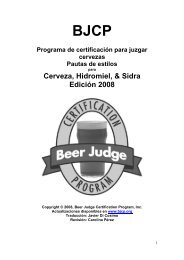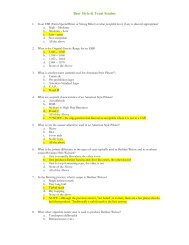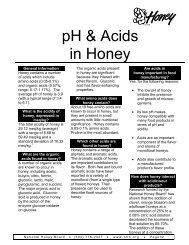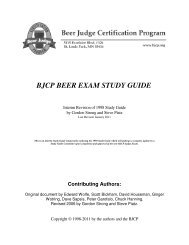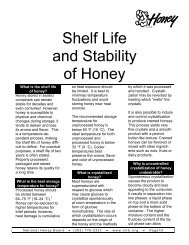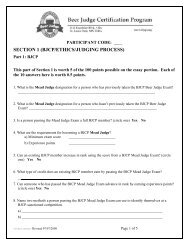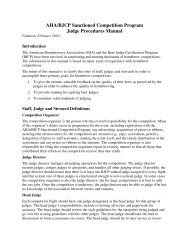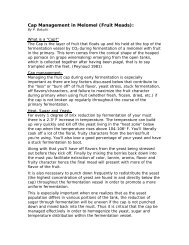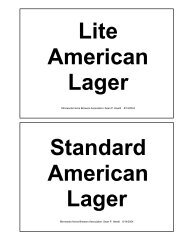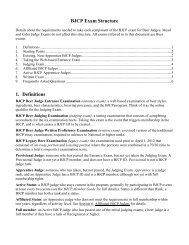Exam Administration Instructions - BJCP
Exam Administration Instructions - BJCP
Exam Administration Instructions - BJCP
You also want an ePaper? Increase the reach of your titles
YUMPU automatically turns print PDFs into web optimized ePapers that Google loves.
<strong>Exam</strong> Procedures<br />
Planning the <strong>Exam</strong><br />
Planning for giving a <strong>BJCP</strong> Beer <strong>Exam</strong> requires attention to a number of important details. The<br />
requirements for each type of <strong>BJCP</strong> examination differ. The details for each <strong>BJCP</strong> beer exam type are<br />
provided below.<br />
<strong>BJCP</strong> Beer Judging <strong>Exam</strong>ination Requirements<br />
In general, a minimum of six participants are required to schedule a <strong>BJCP</strong> Beer Judging <strong>Exam</strong>ination,<br />
and the date and administrator must be approved by the <strong>BJCP</strong> <strong>Exam</strong> Director<br />
(exam_director@bjcp.org). Plan on scheduling the exam at least six months in advance, since there are<br />
limits on how many exam sites are allowed in any given month. It is also, strongly recommended that<br />
the sponsor collect a non-refundable deposit to ensure that there are enough participants committed to<br />
take the exam. An exam can only be scheduled by submitting an <strong>Exam</strong> Data Approval Form (EDAF).<br />
The maximum number of participants for the <strong>BJCP</strong> Beer Judging <strong>Exam</strong>ination is twelve, with limited<br />
exceptions made by the <strong>BJCP</strong> <strong>Exam</strong> Directors. For example, the maximum number may be increased to<br />
twenty if the local exam administrator recruits <strong>BJCP</strong> exam graders from the region to fill four exam<br />
grading slots. The motivation is that the graders help sustain the exam program while contributing to the<br />
growth of the <strong>BJCP</strong> in their region. These four grading assignments could be a different twenty exam<br />
set, or two standard twelve exam sets. If the graders do not complete their assignments, the maximum<br />
number of participants reverts to the default value of twelve.<br />
All participants taking the <strong>BJCP</strong> Beer Judging <strong>Exam</strong>ination must have either passed the web-based<br />
<strong>BJCP</strong> Beer Judge Entrance <strong>Exam</strong>ination or scored higher than 60% on the written portion of the<br />
<strong>BJCP</strong> Legacy Beer <strong>Exam</strong>ination (given prior to April 1, 2012). These participants should bring their<br />
<strong>BJCP</strong>-ID, <strong>BJCP</strong> certificate, or e-mail confirmations of passing so that the exam administrator can verify<br />
their status. Any exam submitted to the <strong>BJCP</strong> for grading that was written by a participant that was not<br />
eligible to take the exam on the date it was written will not be graded and the exam fee will not be<br />
refunded.<br />
It is also the <strong>Exam</strong> Administrator’s responsibility to make sure everyone taking the exam is of legal<br />
drinking age under the laws in effect in the location where the exam is given.<br />
<strong>Exam</strong> Proctors<br />
Administering the <strong>BJCP</strong> Beer Judging <strong>Exam</strong>ination requires an exam administrator as well as a<br />
minimum of two proctors. The proctors’ role is to score the exam beers with no additional information<br />
beyond that made available to the examinees other than allowing the proctors to use the <strong>BJCP</strong> Style<br />
Guidelines. The proctors are to provide scoresheets not biased by information not available to the<br />
Page 1 of 7 revised 10/24/2012
examinees, that is why the exam administer does not also function as a proctor – the exam administrator<br />
selects/prepares the exam beers and generally knows too much about the beers.<br />
Grading tasting examinations requires high quality proctor score sheets. To ensure this, the proctors<br />
must come from a pre-approved proctor list drawn from the pool of “active” National and Master judges<br />
found on the <strong>BJCP</strong> web site in the pages at http://www.bjcp.org/apps/reports/proctors.php . This page is<br />
dynamically generated when the <strong>BJCP</strong> database of judge scores and experience is updated. If the<br />
administrator for an exam administration site is not able to obtain proctors from this list, they MUST<br />
contact the <strong>Exam</strong> Director at least two weeks prior to the exam to get advance approval to use<br />
alternative proctors.<br />
The <strong>BJCP</strong> <strong>Exam</strong> Director (exam_director@bjcp.org) can grant waivers from the proctor rules but such<br />
exceptions are expected to be rare. The use of a proctor with less than National-level rank, including the<br />
use of judges with minimum tasting score of 80 and more than 10 judging experience points requires<br />
pre-approval by the <strong>Exam</strong> Director. We further desire that at least one proctor be a Master-level judge<br />
(or higher) or a judge with a minimum tasting score of 90 and with at least 20 judging experience points.<br />
If one or more of the proctors is Master-level, then a third proctor can be used that only has a Certifiedlevel<br />
rank.<br />
Potential proctors must be identified when scheduling a <strong>BJCP</strong> Beer Judging <strong>Exam</strong>ination. The <strong>Exam</strong><br />
Director can grant waivers to the proctor requirements, but these waivers are expected to be limited to<br />
examinations outside of North America and to areas with very few existing <strong>BJCP</strong> judges. Such waivers<br />
must be coordinated with the <strong>Exam</strong> Director before scheduling the examination.<br />
Travel Expenses<br />
Each exam proctor earns one judging experience point and five Grand Master Service Requirement<br />
(GMSR) credits for his or her efforts, and this is generally sufficient to balance expenses associated with<br />
traveling to the exam. The exam administrator is allocated 30% of the exam fees for expenses<br />
associated with the exam, and a portion of this can be used to subsidize the proctors’ travel expenses.<br />
However, in special cases, such as when the exam is in a remote location or there are a large number of<br />
examinees, the <strong>BJCP</strong> Board of Directors may grant stipends to cover higher than normal administrative<br />
and travel expenses. Requests for these stipends must be made to the <strong>Exam</strong> Director at least three<br />
months prior to the exam date, and the requests are limited to reasonable and actual expenses, such as<br />
one night in a hotel, gasoline, or translation fees. Scanned copies of receipts should be submitted to the<br />
exam director after the exam, and reimbursement will be made by the <strong>BJCP</strong> treasurer (preferably<br />
through PayPal).<br />
<strong>BJCP</strong> Beer Judge Written Proficiency <strong>Exam</strong>ination<br />
In general, a minimum of six participants are required to schedule a <strong>BJCP</strong> Written Proficiency<br />
<strong>Exam</strong>ination, however the majority of the Written Proficiency <strong>Exam</strong>s in the United States will be<br />
regional exams administered annually. These exam sites for 2013 are listed below and were selected<br />
based on the number of qualified judges, the number of exams administered in 2010-2012, and the<br />
number of exams scheduled in 2012 and 2013. In addition, there will be a Written Proficiency <strong>Exam</strong><br />
administered in conjunction with the AHA National Homebrew Conference. Additional Written<br />
Proficiency <strong>Exam</strong>s may be scheduled at other US and international locations by submitting an EDAF<br />
along with confirmation that there will be at least six qualified participants.<br />
All participants taking the <strong>BJCP</strong> Beer Judge Written Proficiency <strong>Exam</strong>ination must have achieved a<br />
score of at least 80% on either the <strong>BJCP</strong> Beer Judging <strong>Exam</strong>ination or on the tasting portion of the<br />
<strong>BJCP</strong> Legacy Beer <strong>Exam</strong>ination and they must have amassed at least 10 <strong>BJCP</strong> judging points. If the<br />
Page 2 of 7 revised 10/24/2012
exam administrator is uncertain about the credentials of the written exam candidate, he or she should<br />
request approval from the <strong>BJCP</strong> <strong>Exam</strong> Director (exam_director@bjcp.org). There will be no exceptions<br />
to these rules. Any exam submitted to the <strong>BJCP</strong> for grading that was written by a participant that was<br />
not eligible to take the exam on the date it was written will not be graded and the exam fee will not be<br />
refunded. As noted above, at least six participants will generally be required to schedule a <strong>BJCP</strong> Beer<br />
Judge Written Proficiency <strong>Exam</strong>ination, but exceptions will be made in special circumstances.<br />
The regional Written Proficiency <strong>Exam</strong> sites for 2013 are: Seattle, San Francisco/Sacramento, San<br />
Diego/Los Angeles, Denver/Boulder, Houston (Dixie Cup), Minneapolis, Chicago/Milwaukee/Madison,<br />
Plymouth(MI)/Ann Arbor, Rochester/Buffalo, Philadelphia (NHC), and Charlotte/Raleigh. Please check<br />
the online exam calendar for specific dates.<br />
<strong>Exam</strong> Fees<br />
The fees for the <strong>BJCP</strong> Beer Judging <strong>Exam</strong>ination are US $40 for first time takers and $15 for<br />
subsequent retakes. The fee for the <strong>BJCP</strong> Beer Judge Written Proficiency <strong>Exam</strong>ination is $15.<br />
Thirty percent of the fee for each exam is designated for expenses related to holding the exam, and may<br />
be split between the sponsor and administrator. If there are to be additional expenses such as room<br />
rentals or transportation, please get approval from the exam director prior to the exam, and send receipts<br />
to the exam director for reimbursement.<br />
The sponsor or administrator, at their discretion, may reduce individual exam fees by waiving a portion<br />
of their allotment. This is acceptable as long as the <strong>BJCP</strong> receives $28 (70% of $40) or $10.50 (70% of<br />
$15) for each participant.<br />
<strong>Exam</strong>inees should pay the <strong>Exam</strong> Administrator (if using checks, make them out directly to the <strong>Exam</strong><br />
Administrator). The <strong>Exam</strong> Administrator then submits the payment using PayPal directly to the <strong>BJCP</strong><br />
for 70% of total fees. No cash or checks, please. The payment system is at<br />
http://www.bjcp.org/apps/exam_pay/exam_find.php. The PayPal system is for <strong>Exam</strong> Administrators<br />
only; do not advertise this link to examinees.<br />
Before the <strong>Exam</strong><br />
<strong>Exam</strong> Papers for All <strong>Exam</strong>inations<br />
Approximately two weeks before the exam, you will be sent the exam questions (if a written exam will<br />
be administered), the participant information form (PIF), beer scoresheets (judging exam) and other<br />
documents that are needed for the exam. You will need to make copies of these forms for each exam<br />
taker. On the PIF, please place sequential numbers (1, 2, 3, etc.) after the four digit, four letter exam<br />
code (e.g., 1204-CALA) to identify the examinees. This ensures anonymity throughout the grading<br />
process. The exams will be copied before they are sent to the graders, so please use standard size<br />
(8.5 by 11) ruled paper and instruct the participants to write on only one side and to NOT write in<br />
the margins – the originals need to be photocopied for the graders and copy machines tend not to<br />
copy all the way to the edges of the original. The exam director will also provide a lined answer<br />
sheet template that may be used if ruled paper is not available.<br />
<strong>Exam</strong> Beers for the <strong>BJCP</strong> Beer Judging <strong>Exam</strong>ination<br />
You will need six beers for the judging portion of the exam, with sufficient volume of each for all<br />
examinees and proctors. A good rule of thumb is 3-4 oz. per sample. It is strongly recommended that<br />
these beers be homebrews and represent a reasonable cross section of mainstream classic beer styles.<br />
Page 3 of 7 revised 10/24/2012
Leftover beers from homebrew competitions are excellent sources of beers for a <strong>BJCP</strong> exam, and beers<br />
from similar styles can often be blended to make a unique sample. Do not use specialty, fruit or herb<br />
beers (do not use <strong>BJCP</strong> styles 16E, 20, 21A, 21B, 22B, 22C, or 23). The six exam beers must be unique<br />
styles; multiple versions of the same style shall not be used in an exam, e.g., you cannot present two<br />
different examples of a Dry Stout. Up to three classic-style commercial beers may be used if sufficient<br />
suitable examples of homebrewed beer are not available, but these selections should be communicated<br />
to the exam director (exam_director@bjcp.org) in advance of the exam. When using classic-style<br />
commercial examples, insure that the brands chosen actually do reasonably represent the style named on<br />
the label. Two of the beers should have distinctly noticeable faults or characteristics (avoid threshold<br />
flavor faults/characteristics including mildly stale examples), such as the examples in this list:<br />
<br />
<br />
<br />
<br />
<br />
<br />
<br />
<br />
<br />
diacetyl/buttery;<br />
DMS/cooked vegetable;<br />
oxidized/cardboard;<br />
lactic or acetic acid sourness;<br />
green apple/acetaldehyde;<br />
fruitiness/esters;<br />
solvent-like/higher alcohols;<br />
puckering/astringent;<br />
grossly incorrect body, alcohol content, color or other style characteristics.<br />
Naturally flawed beers or blends of different homebrewed beers are strongly preferred. Doctoring beers<br />
to obtain these characteristics is discouraged due to variable results, but if there is no alternative, the<br />
doctoring procedures outlines in Section II.E of the <strong>BJCP</strong> Study Guide should be used. The base beers<br />
being doctored should not be clean light lagers, as in a flavor training class, but more common styles<br />
such pale ales, German lagers or dark ales. One of the beers should be an excellent (38-44) or<br />
outstanding (45-50) example of its style. In order to ensure that the proctors and examinees are judging<br />
the same beer, the beers should be blended and decanted from a pitcher. Each beer should be served to<br />
the participants under optimum temperature conditions. Avoid delays between decanting beers and<br />
serving. Announce each beer style and sub-style as it is served but provide no additional information.<br />
Strive to serve beers in the following categories – both lagers and ales, light and dark beers, and both<br />
low and high gravity styles, for example:<br />
1. Lager (<strong>BJCP</strong> styles 1-5)<br />
2. Hybrid or German Wheat (<strong>BJCP</strong> styles 6, 7, 15)<br />
3. English or American Ale (<strong>BJCP</strong> styles 8, 10)<br />
4. Dark ales (<strong>BJCP</strong> styles 9, 11-13)<br />
5. Belgian (<strong>BJCP</strong> styles 16-18)<br />
6. IPA and Strong (<strong>BJCP</strong> styles 14, 19)<br />
A specific example of a suite of exams beers is as follows:<br />
1. English Pale Ale – flaw such as incipient oxidation and weak hop aroma<br />
2. German Weizen - good example, but with slightly too much sourness<br />
3. Doppelbock – no flaws, outstanding example<br />
4. Belgian Saison – somewhat flawed, with higher than desirable phenols or alcohol<br />
5. Imperial Stout – very good example, but lacks smoothness found in best examples<br />
6. American IPA – seriously flawed with fruitiness, astringency or diacetyl<br />
Page 4 of 7 revised 10/24/2012
While only one hypothetical suite of beers, these cover a range of styles, colors, strengths and quality.<br />
The appropriate range in scores likely spans the low teens to the mid-40s. It is encouraged to discuss<br />
your ideas for exam beers with the <strong>Exam</strong> Director prior to the exam.<br />
The proctors’ scoresheets will be the basis of comparison for the graders’ evaluation of the examinees.<br />
Proctors must be served each beer with only the same information as provided to the test takers. It is<br />
highly recommended that the <strong>Exam</strong> Administrator refrain from preparing scoresheets if he or she also<br />
prepares and serves the test beers. This may introduce bias into the scoring since the exam administrator<br />
knows more about the source of the beers than the participants. If you are unable to obtain two suitable<br />
proctors that have no knowledge of the beers please contact the <strong>Exam</strong> Director for help in producing<br />
exam beers that you will be unfamiliar with so you can score them. Note that we are now using expanded<br />
scoresheets for the proctors and are asking them to refrain from discussion until after they finish their<br />
scoring and comments on the scoresheet – at that time they are to complete the consensus sheet for the<br />
beer but are not to alter their original scoresheets.<br />
Provide information to the <strong>Exam</strong> Director about each beer served using the following template:<br />
1. Style of beer as brewed, entered in competition or marketed.<br />
2. Identify as homebrewed, or brand of beer if commercial example<br />
3. Draft or bottled<br />
4. If bottled, conditioned or counter pressure filled<br />
5. Approximate age (freshness) of beer (if known)<br />
6. Distinctive fault(s) or characteristic(s), e.g., contaminated, diacetyl, esters, oxidation, distinctive<br />
hop aroma/flavor, body, alcohol, etc.<br />
7. Comments on blending, doctoring, adjusting, whatever that might impact the perception of the<br />
beer.<br />
8. Any other notes that might be useful for the graders, such as expected scoring range or why the<br />
beer was chosen for the exam.<br />
During the <strong>Exam</strong><br />
Format<br />
The <strong>BJCP</strong> Beer Judging and Beer Judge Written Proficiency <strong>Exam</strong>inations both have 90-minute<br />
time limits, but many exams will only offer the judging portion. If there are any participants taking the<br />
written exam, it should be administered first, with a 15-30 minute break before the commencement of<br />
the judging exam. Those participants only taking the judging exam should be respectfully quiet if they<br />
arrive while the written exam is being administered. The beers in the judging exam should be served at<br />
15 minute intervals. The scoresheets for the tasting examination should not be passed out for the essay<br />
examination. A typical schedule is:<br />
9:00: Written exam begins<br />
10:30: Written exam concludes, with answer sheets collected<br />
10:30-10:55: Participants arrive for judging exam<br />
11:00: Judging exam begins<br />
12:30: Judging exam concludes, with scoresheets collected<br />
<strong>Exam</strong> Checklist<br />
1. Copies of the PI form for all examinees, the proctors, and yourself.<br />
2. Copies of the exam cover sheet.<br />
3. Judging exam: Copies of the examinee and proctor scoresheets.<br />
Page 5 of 7 revised 10/24/2012
4. Written exam: Copies of the exam questions.<br />
5. Sufficient supply of standard size (8.5. by 11), ruled paper – preferably not three-hole punched<br />
loose-leaf paper, since it tends to jam in copy machines. If this is not available, the exam<br />
director can provide a lined template that can be used to generate answer sheets.<br />
6. Judging <strong>Exam</strong>: <strong>Exam</strong> beers, bottle opener, pitcher and cups.<br />
7. Judging <strong>Exam</strong>: Water and bread to cleanse the palate.<br />
8. Mechanical pencils.<br />
At the Start of the <strong>Exam</strong>, Please Explain that:<br />
<br />
<br />
<br />
<br />
<br />
<br />
The written and judging exams are both closed book, so the <strong>BJCP</strong> Style Guidelines and other<br />
references cannot be used.<br />
Most essay questions can be answered in about 1.5 to 2 pages. If the participants are writing<br />
significantly more or less, adjustments may be made. Partial credit is given for incomplete<br />
answers, so instruct the participants not to skip any questions.<br />
The exam requires advance payment. Offer a refund to anyone who is not prepared, but only<br />
before the exam has been distributed.<br />
<strong>Exam</strong>inees need to legibly complete the participant information form. It is otherwise difficult to<br />
return the results.<br />
<strong>Exam</strong>inees must place their examinee codes on all exam papers and write on only one side of<br />
the answer sheets.<br />
The six test beers should be evaluated as if the prospective judges were participating in a <strong>BJCP</strong><br />
competition. They will be graded on completeness, descriptive ability, perception, feedback and<br />
scoring accuracy.<br />
Use of Electronic Devices<br />
Use of the following electronic devices is not allowed during the <strong>BJCP</strong> examinations:<br />
<br />
<br />
<br />
<br />
<br />
<br />
<br />
Calculators, except for basic “four-function” models. By “four-function” we mean basic<br />
calculators that do not have the ability to store programs or data for redisplay.<br />
Pagers<br />
PDAs<br />
Laptop or desktop computers.<br />
Cell phones. In the case of an emergency, phones may be left with the Administrator with<br />
instructions for answering.<br />
Walkman/iPod or other listening devices.<br />
Headphones of any type.<br />
<strong>Exam</strong>inees with any special needs are required to contact the <strong>Exam</strong> Director to work out specific<br />
procedures a minimum of 6 weeks in advance of the exam date.<br />
PI Forms should also be completed by the proctors, and even by you the exam administrator. We have<br />
found that this gives us another means of collecting address changes for some judges.<br />
Results: When the grading has been completed, the official results and a report to the participant will<br />
be mailed to the examinees as soon as the exam information has been entered into the <strong>BJCP</strong> database.<br />
The judging record will list the competitions in which the each participant has judged. There are often<br />
omissions, but instructions will be provided on how to bring the judging records up-to-date. In keeping<br />
with the <strong>BJCP</strong> Privacy Policy, the exam scores are not released to the <strong>Exam</strong> Administrator.<br />
Page 6 of 7 revised 10/24/2012
After the <strong>Exam</strong><br />
Copy the exams: The exam administrator is responsible for making a complete copy of the exams,<br />
proctor sheets, exam beer notes and PI forms—every page must be copied. The exam administrator<br />
should retain the copies until the <strong>BJCP</strong> <strong>Exam</strong> Director confirms that the originals have been received. If<br />
this confirmation is not received within two weeks, contact the <strong>Exam</strong> Director to confirm – exams have<br />
been lost in the mail before. The administrator should then provide a copy of their individual exam to<br />
each of the examinees. This copy is the only copy that will be made available to the examinees. Under<br />
no circumstances will the <strong>BJCP</strong> be returning the originals or copies of the exams. The cost of making<br />
this copy is expected to be covered by the 30% of the exam fee allotted for the administration of the<br />
exam.<br />
Scoring and Turnaround Time: <strong>Exam</strong>s should be mailed to the exam director as soon as possible<br />
after the exam date, but no later than one week after the test.<br />
It is anticipated that the exam results will be returned within sixteen to twenty weeks of the exam date.<br />
Approximately half of this time is used by volunteer National and higher ranked judges to do the<br />
comprehensive scoring of the exams. Their scoring and feedback is then reviewed by both an Associate<br />
<strong>Exam</strong> Director and the <strong>Exam</strong> Director before being sent to the Assistant <strong>Exam</strong> Director for processing<br />
and recording of the results.<br />
Experience Points: You will receive <strong>Exam</strong> Administrator experience as ten GMSR points (see<br />
http://www.bjcp.org/gmsr.php for the details) which in turn results in two non-judging experience<br />
points. You are permitted to delegate some or all of these experience points to those who assist with the<br />
exam, but at present no additional points will be given for these supporting roles. As noted above,<br />
additional judging experience points are available to proctors who serve as independent tasters of the<br />
exam beers. They are to evaluate the beers with only the same information as that given the examinees<br />
– namely the style in question. They are not to consult and resolve scoring discrepancies. The proctors<br />
should be informed that their scoresheets will be evaluated by the graders and director for quality, and<br />
points may not be awarded if the proctors’ work is substandard. Similarly, some or all of the<br />
administrator’s points may not be awarded if it is apparent that these instructions were not followed, or<br />
the exams are not received within ten days of the exam date.<br />
Page 7 of 7 revised 10/24/2012


